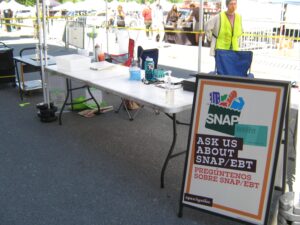
At the start of the New Year, this good news should be noted: it’s an achievable goal for all Americans to know where their food comes from and to have the choice to eat healthfully regardless of their income status.
Michael Pollan’s mantra, concisely stated in his humorous and insightful Food Rules, to “Eat Food, Not Too Much, Mostly Plants,” sets a goal that has become more easily achieved with the increasing number of farmers markets. Since the Agricultural Marketing Service of the U.S. Department of Agriculture (USDA) began tracking farmers markets nearly 30 years ago, the number of markets in the United States has grown to nearly 9,000 with estimated total annual sales of $1 billion.
Moreover, a good number of farmers markets today welcome the use by low-income customers of their SNAP benefits, and in fact, some actually “incentivize” the use of SNAP benefits. (SNAP is the federal benefits program for low-income households, formerly known as food stamps.)
For example, in Massachusetts, the Healthy Incentives Program (HIP) provides SNAP users with a financial incentive when they use a portion of their monthly benefits to purchase food from one of more than 240 participating Massachusetts farmers at farmers markets, mobile markets, and farm stands around the state. The Massachusetts Healthy Incentives Program provides a dollar-for-dollar match, up to a monthly limit dependent on household size, for SNAP dollars spent on fruits and vegetables purchased at participating farmers markets, farm stands, mobile markets, and community supported agriculture (CSA) programs across the state.
The number of winter farmers markets in Massachusetts has grown significantly in recent years because of growth in demand thanks to HIP, according to Winton Pitcoff, Director of the Massachusetts Food System Collaborative. Shoppers in Massachusetts can easily find Massachusetts farms and markets online that participate in the Healthy Incentives Program. And our directory of community supported agriculture (CSA) farms in Massachusetts now includes over 50 listings, and presumably some participate in this praiseworthy program.
Since the launch of the Healthy Incentives Program in April 2017, Massachusetts SNAP recipients have purchased more than $30 million of produce from local farmers, earning back an equal amount of incentives in the process. More than 110,000 households have participated in the program as of November 2021, representing more than 209,000 individuals. 44% of the households that have utilized the program include a senior, 30% include a child, and 29% include a person with a disability.
The Massachusetts Food System Collaborative, a community organization whose work includes educating the public about the value of a healthy local food system, has successfully led the Campaign for HIP funding in the state. Its success in building a coalition made up of “more than 300 farmers, farmers’ market managers, local food, anti-poverty and public health organizations, local businesses, advocates and people with lived experience with food insecurity” is laudable.
It’s also been noted by Winton Pitcoff that the Campaign for HIP funding in Massachusetts has secured $47 million in state investment since 2017 to ensure HIP has enough funding each year in the state budget to operate year-round, support increased growth in use, and allow new farmers, especially BIPOC (Black, Indigenous, People Of Color) farmers, to participate in and benefit from the program. The Massachusetts State Legislature’s Food System Caucus has consistently prioritized HIP funding in the last several years, helping lead to the program’s success.
On its website, the Massachusetts Food System Collaborative has available for study the Massachusetts Local Food Action Plan which was completed and accepted by the Massachusetts Food Policy Council back in 2015. This plan can be a model and inspiration for other states and Canadian provinces, not as far along the path as the Commonwealth of Massachusetts, in making real and healthy food available for more people regardless of income status.
Bravo!
(Frank W. Barrie, 1/4/22)





